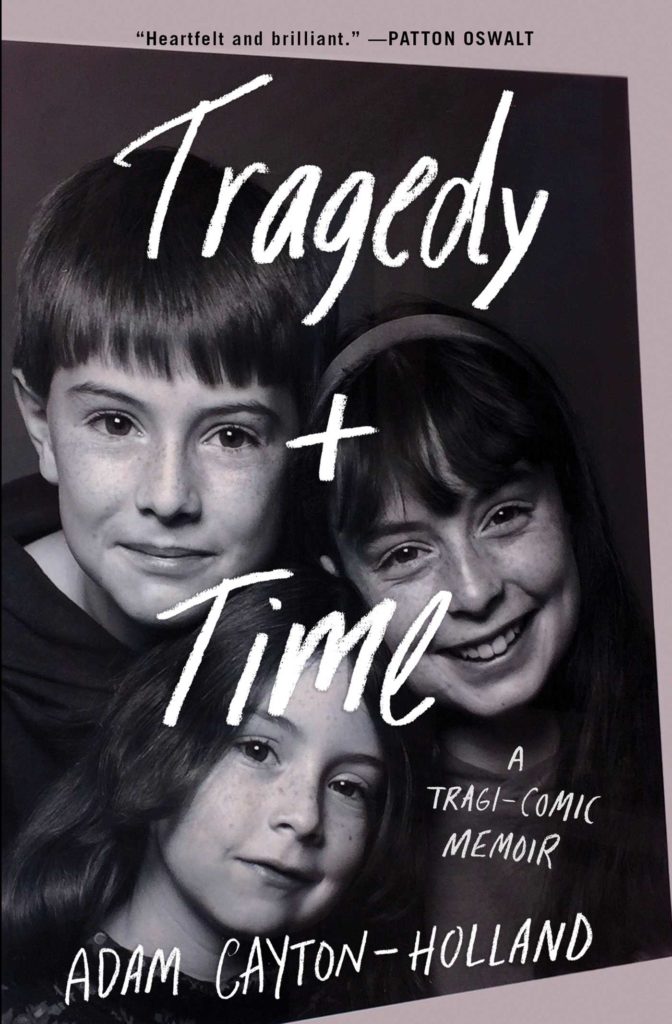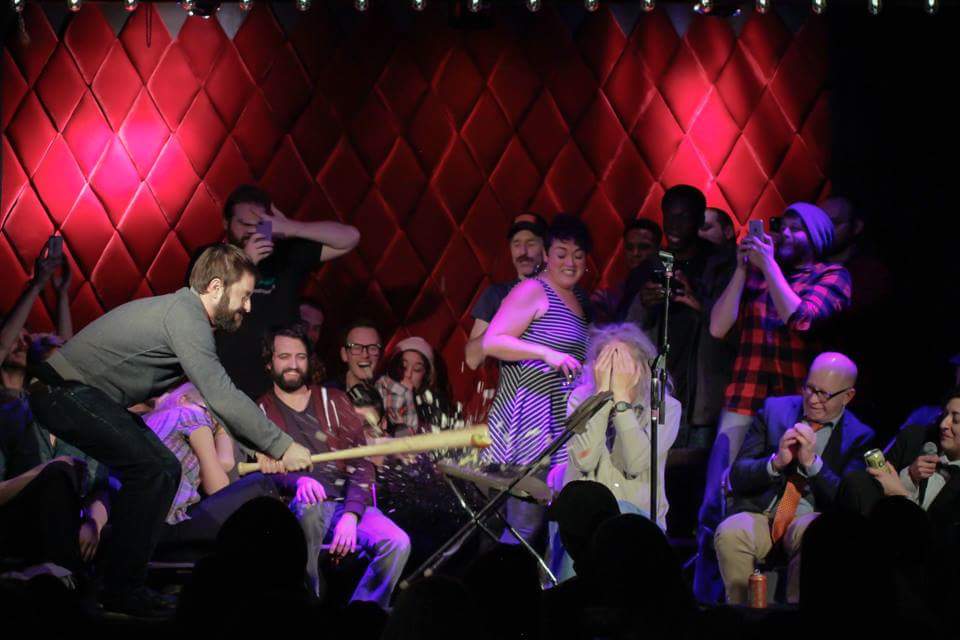
Comedian Adam Cayton-Holland's career was taking off. It was 2012 and he was landing gigs beyond the Denver clubs and dive bars where he had honed his act. Esquire magazine named him one of that year’s 25 best new standup comedians. And he and two Denver comedy buddies landed a TV deal with Amazon to shoot a pilot for a series called “Those Who Can’t,” about a group of dysfunctional high school teachers.
Cayton-Holland should have been on top of the world, but instead of celebrating, he found himself bursting into tears in his car. Days earlier, his younger sister, Lydia, his best friend, had killed herself. She was 28. Cayton-Holland had discovered Lydia's body in her Denver home.
His new memoir, “Tragedy + Time,” is both a loving tribute to his sister and a unflinchingly honest look at his own struggle to come to terms with her suicide. Cayton-Holland talked to Colorado Matters live on stage at the Newman Center on the University of Denver campus. Answers have been edited for clarity.
Interview Highlights

On why he wrote a book about such a personal topic:
"For me, writing the book was earnestly how I processed it. I did a lot of therapy, but putting it down into words for me was the best way to get through a lot of it. As soon as this happened I was kind of doing well in comedy, and I had been making jokes for eight years.
And suddenly the worst, most unimaginable thing happened to me, and I didn't feel funny, and I didn't feel like getting up on stages and making jokes. But after a little while of mourning and trying to get back up on the horse, I felt like, I’m going to start writing about this. And so I wrote some articles that really helped me purge a lot of what I was going through. And that led to this opportunity to write the book.
Unfortunately I’m this very creative person who feels the need to share what I’m going through all the time. I’ve chosen a creative path in life, stand up and writing, and so I work through a lot of what I’m going through and experiencing in the things I produce. It just felt to me like this happened and suddenly I couldn't talk about it, I didn’t want to talk about it, it was breaking me into two. Writing about it was the only way I could sort of start to feel like I was addressing it."
On his sister Lydia's OCD tics and incredible empathy since childhood:
"I think Lydia was the most empathetic and the most wounded by the sadness and suffering and hurt we all see in the world. Lydia would also just count dead animals on the side of the road. She would recognize them way more than anyone else would, and she really felt that death every time. And it was sad. She was saddened by it. It was devastation every time.
Well I had OCD. I still have OCD. But Lydia’s tic was so iconically Lydia. If something fell on the ground, say a goldfish cracker or a peanut or something, if you accidentally dropped one, Lydia would drop another one instinctually so that it wasn’t lonely. And then that eventually turned into threes, representing me and Anna (his older sister) and Lydia. That was Lydia in a nutshell. She cared about those things. Nobody else I’ve ever met would be like, ‘That poor wayward peanut! It needs a friend!’ And that was Lydia."

On how he has tried to come to terms with Lydia's suicide:
"One of my goals with this book was to illustrate that it’s a constant struggle. You never land at one place of resolution, or, ‘Ok, I think I’ve got my final thought on this.’ It’s always there and it’s always changing. I definitely have a conclusion that I’ve landed at. Even knowing that conclusion, it's an academic knowing. Sometimes it’s impossible not to be like, ‘What if I’ve done this that night,’ or just feel guilt or anger or any of the stages of grief.
Lydia was an empath. More than anyone I’ve ever known, she was truly empathetic to all living and nonliving creatures. To see us hurting, the family hurting, would break her in two. If she ever saw us hurting or she caused us hurt, she was mortified. If she saw I was down, she would be there tap dancing and trying to do anything she could to get me up. And that’s true for any of our family members.
The fact that she did this, that she took her life, knowing that that would devastate all four of us, and still decided that that was the out she had to take, really puts me in touch with her level of desperation, and her level of mental illness. That it would kill her to cause us that hurt, yet still, ‘I gotta do it, because my hurt is greater.’ When you get to that place, you’re not mad or guilty anymore, you’re just sad for that person. That's the profound thought I’ve stopped at. But I continue to waver."
On Lydia as his comedic partner:
"Lydia and I spent hours together watching television and forming our bizarre senses of humor. I realized she was my first co-conspirator. We would riff together. And as I got more established in comedy, she was helping out with shows, she was running the door and making flyers and running tech. And the day after big shows, we’d go have breakfast and tag my bits. She’d be like ‘You should remove this part,’ or ‘What if you did this?’ They were the type of intimate conversations you should only allow with a fellow comic. But this was Lydia, the funniest person I know and my little sister. So I was like, ‘Yeah, get in here, let’s talk about that!’ And her suggestions were awesome."
On sharing the book with his family:
"It’s an odd thing. Obviously I wrote this, obviously I’m peddling it, obviously I want it to do well. I gave it to my family, to every member to read before I turned it into the publisher. And I was like ‘Anything you want changed, it’s changed. Obviously I’m not trying to make our family have anymore pain or suffering. We’ve been through enough. If you want anything changed, let me know.’
And they were all cool with the depiction. They had some different memories here or there. Nothing was like ‘You take that out!’ Because there was nothing bad. I love the family. It’s a loving portrayal. It was more just like, ‘I remember this differently. You might want to tweak it that way.’ Helpful suggestions.
My mom gave me the nicest compliment ever. She read it in one sitting. She laughed and she cried a lot. She said, ‘I felt like I spent the afternoon with Lydia.’ After that, you don’t care what Publishers Weekly has to say about it. That’s the best I can hope for."








